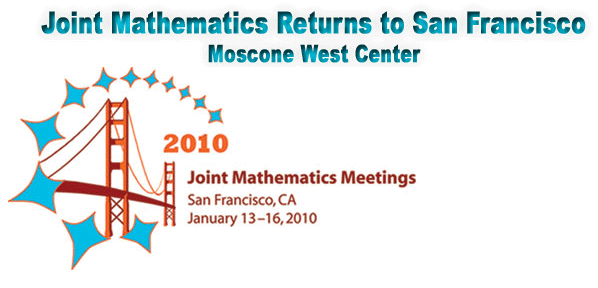For updated locations, click here; All locations are subject to change
Two workshops have been organized for presentation on Tuesday, January 12, before the Joint Mathematics Meetings actually begin. They will be held in the San Francisco Marriott Hotel. There is no cost to participate. To apply see www.causeweb.org/workshop.
Teaching Introductory Statistics, Tuesday, 8:30 a.m. - 5:00 p.m., Pacific I, San Francisco Marriott, presented by Carolyn K. Cuff, Westminster College, and Michael A. Posner, Villanova University. In May, 2005, the American Statistical Association endorsed the Guidelines for Assessment and Instruction in Statistics Education (GAISE). The guidelines were created to give sufficient structure to instructors and yet allow sufficient generality to include good practices in the many flavors of the first statistics course. The recommendations include:
1. Emphasize statistical literacy and develop statistical thinking; 2. Use real data; 3. Stress conceptual understanding rather than mere knowledge of procedures; 4. Foster active learning in the classroom; 5. Use technology for developing conceptual understanding and analyzing data; and 6. Use assessments to improve and evaluate student learning.
This workshop will consider the implementation of those guidelines in a first-level statistics course. What are the big ideas of statistics? How can those big ideas be communicated to students? What are effective evaluation and assessment tools? We will begin to answer those questions through considering ways to engage students in statistical literacy and thinking. The contrast between conceptual and procedural understanding will be explained using examples.
The workshop is meant for instructors new to teaching introductory statistics.
For most of the workshop, participants will engage in many of the classic activities that all statistics instructors should know. Different types of available technology will be demonstrated; different types of texts will be explored. Internet sources of real data, activities, and best practices articles will be examined. Participants will find out how they can continue to answer the three questions by becoming involved in statistics education related conferences, newsletters, and groups.
Become a Catalyst for Change in Statistics Education, Tuesday, 9:00 a.m. - 5:00 p.m., Pacific J, San Francisco Marriott, presented by Joan Garfield, Bob delMas, and Andy Zieffler, University of Minnesota, and Allan Rossman and Beth Chance, California Polytechnic Institute. This one-day workshop will feature materials developed by the NSF-funded CATALST project (Change Agents for Teaching and Learning Statistics). The changes we are working towards are in both content and pedagogy of the introductory, non-calculus based statistics course. The materials to be shared are designed to help students achieve the learning goals listed in the ASA-endorsed GAISE Report (see amstat.org). We have developed sets of hands-on activities that form units based around a particular real world problem (e.g., how to develop a SPAM filter for email) and the related statistical ideas that emerge from this type of problem. The problems, called "Model Eliciting Activities", are rich and complex open-ended problems that stimulate statistical thinking, engage students in creating developing and testing unique models to solve the problem, and prepare them to learn the statistical content that follows in the unit. The CATALST materials focus on important ideas of statistical inference and the use of simulation throughout the course.
